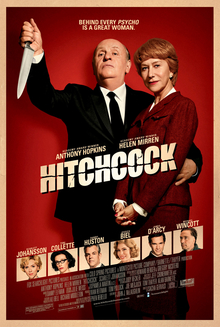
Blondes make the best victims. They're like virgin snow that shows up the bloody footprints.
-Alfred Hitchcock
Sorry folks for the extremely long delay in posts. I was out sick last week and am catching up on my work as I write this. Hard to type two blogs at once - so if you read anything on home theatre systems that does not fit in with this post, I apologize.
Before contracting the flu, I travelled to London, Ontario to see Hitchcock (2012) with a friend. The theatre was a small, art house-esque theatre with major chain prices. I was willing to pay anything to see another homage to my favourite director, Alfred Hitchcock. I first saw him when I was 16 in media studies watching Psycho (1960). Unlike my fellow classmates, my desire to watch horror and thriller films was extremely limited. So when I jumped at the sudden opening of Marion Crane's shower curtain, everyone giggled at my terror. But for a newbie to those genres and Alfred Hitchcock films, I didn't know what to expect. Looking back Psycho may appear tame, but special effects would've only created skeptics of film goers sooner.
When I discovered the novel "Alfred Hitchcock and The Making of Psycho" was being produced into a movie, I was excited for more insight into the film. I was anticipating the creation of Psycho from Hitchcock's point-of-view, even though the adaptation of this novel is from the research of Stephen Rebello. But this film felt more like a love story between Hitchcock and his wife Alma Reville. Anthony Hopkins and Helen Mirren, as well as the entirety of the all-star cast, did an excellent job in their performances; although, Hopkins looked more like Hannibal Lecter had been stung by a bee. The plot, however, captured less of the making of Psycho than I anticipated.
I wanted to know more about Janet Leigh's work on her character, how Anthony Perkin's emulated Norman Bates without much work, and the environment surrounding a film like this in the 1960s. I would have to re-read Rebello's work to get more inside looks at the creation of Psycho. Hitchcock's romantic narrative caused me to stir in my seat in anticipation for a sudden killing spree or violent episode, but nothing. I can't say I'm thoroughly disappointed in the film - it did deliver in the promise to find out more about Psycho and Hitchcock, but it overplayed the romantic card too much.
While out sick I decided to watch Psycho again and I can only regret not being alive when the film came out in 1960. I would have loved to been scared mid-movie at Marion Crane's death and not being the only one startled by this. But I guess I'll still be remembered as the boy scared by a black-and-white film in 2003.
Before contracting the flu, I travelled to London, Ontario to see Hitchcock (2012) with a friend. The theatre was a small, art house-esque theatre with major chain prices. I was willing to pay anything to see another homage to my favourite director, Alfred Hitchcock. I first saw him when I was 16 in media studies watching Psycho (1960). Unlike my fellow classmates, my desire to watch horror and thriller films was extremely limited. So when I jumped at the sudden opening of Marion Crane's shower curtain, everyone giggled at my terror. But for a newbie to those genres and Alfred Hitchcock films, I didn't know what to expect. Looking back Psycho may appear tame, but special effects would've only created skeptics of film goers sooner.
When I discovered the novel "Alfred Hitchcock and The Making of Psycho" was being produced into a movie, I was excited for more insight into the film. I was anticipating the creation of Psycho from Hitchcock's point-of-view, even though the adaptation of this novel is from the research of Stephen Rebello. But this film felt more like a love story between Hitchcock and his wife Alma Reville. Anthony Hopkins and Helen Mirren, as well as the entirety of the all-star cast, did an excellent job in their performances; although, Hopkins looked more like Hannibal Lecter had been stung by a bee. The plot, however, captured less of the making of Psycho than I anticipated.
I wanted to know more about Janet Leigh's work on her character, how Anthony Perkin's emulated Norman Bates without much work, and the environment surrounding a film like this in the 1960s. I would have to re-read Rebello's work to get more inside looks at the creation of Psycho. Hitchcock's romantic narrative caused me to stir in my seat in anticipation for a sudden killing spree or violent episode, but nothing. I can't say I'm thoroughly disappointed in the film - it did deliver in the promise to find out more about Psycho and Hitchcock, but it overplayed the romantic card too much.
While out sick I decided to watch Psycho again and I can only regret not being alive when the film came out in 1960. I would have loved to been scared mid-movie at Marion Crane's death and not being the only one startled by this. But I guess I'll still be remembered as the boy scared by a black-and-white film in 2003.
I think I must have one of those faces you can't help believing.
- Norman Bates, Psycho (1960)

